|
|
|
Sort Order |
|
|
|
Items / Page
|
|
|
|
|
|
|
| Srl | Item |
| 1 |
ID:
083486
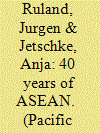

|
|
|
|
|
| Publication |
2008.
|
| Summary/Abstract |
In this introduction, the editors trace the increasing theoretical diversity of ASEAN research and discuss the contributions to this issue against the current state of the art. Contributions confirm the post-Asian crisis advancement of constructivist scholarship, but by also analyzing ASEAN from the Liberal and English school perspectives, the articles assembled in this issue nevertheless stand for theoretical pluralism. This article continues to open a governance perspective and, against this background, attests to ASEAN's marked success in pacifying an erstwhile turbulent world region but also to ASEAN's much more ambiguous record in responding to the new challenges associated with globalization
|
|
|
|
|
|
|
|
|
|
|
|
|
|
|
|
| 2 |
ID:
103166
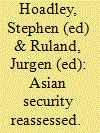

|
|
|
|
|
| Publication |
Singapore, ISEAS Publications, 2006.
|
| Description |
xvi, 381p.
|
| Standard Number |
9789812304001, hbk
|
|
|
|
|
|
|
|
|
|
|
|
Copies: C:1/I:0,R:0,Q:0
Circulation
| Accession# | Call# | Current Location | Status | Policy | Location |
| 055663 | 355.03305/HOA 055663 | Main | On Shelf | General | |
|
|
|
|
| 3 |
ID:
059510
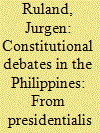

|
|
|
|
|
| Publication |
May-Jun 2003.
|
|
|
|
|
|
|
|
|
|
|
|
|
|
|
|
| 4 |
ID:
131062
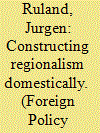

|
|
|
|
|
| Publication |
2014.
|
| Summary/Abstract |
There is a dearth of studies exploring the construction of ideas on regionalism outside Europe. This article seeks to make a contribution to close this gap. It examines the construction of ideas on regionalism in Indonesia, the largest member country of the Association of Southeast Asian Nations (ASEAN). Theoretically, the paper draws from Acharya's concept of "constitutive localization" which it develops further. It offers an alternative explanation to studies which argue that as a result of mimetic behavior, social learning, and cost-benefit calculations, regional organizations across the world become increasingly similar. While this may be the case in terms of rhetoric and organizational structure, it is not necessarily the case at a normative level. The Indonesian case shows that even though foreign policy stakeholders have increasingly championed European ideas of regional integration after the Asian Financial Crisis of 1997/1998, they have skillfully amalgamated them with older local worldviews through framing, grafting, and pruning. European ideas of regional integration thereby served to modernize and relegitimize a foreign policy agenda which seeks to establish Indonesia as a regional leader with ambitions to play a major role in global politics.
|
|
|
|
|
|
|
|
|
|
|
|
|
|
|
|
| 5 |
ID:
133783
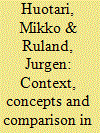

|
|
|
|
|
| Publication |
2014.
|
| Summary/Abstract |
Debating the challenges of comparisons in Southeast Asian studies, the objective of this Special Issue is to advance the agenda of context-sensitive and methodologically reflected Comparative Area Studies (CAS). As a deliberate attempt to infuse new meaning into the embattled genre of area studies, CAS seeks to overcome increasingly rigid (sub-)disciplinary barriers often constructed around methodological arguments. Moreover, through stepping up the inclusion of non-Western regions in the research agenda, CAS also makes a decided bid to transcend the usually strongly Western-centric theory-building in most social science disciplines. This introduction locates the following articles in the broader context of the area studies-discipline divide. It highlights how the challenges of comparative research practice on different layers of social reality are at the heart of this divide but at the same time provide a productive ground for exchange in interdisciplinary Southeast Asian studies. We expand on the contributing authors' arguments by providing a typology of comparative research practice that captures the value of various forms of area studies comparisons and by reflecting on the conceptual preconditions for fruitful comparisons
|
|
|
|
|
|
|
|
|
|
|
|
|
|
|
|
| 6 |
ID:
088450
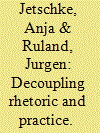

|
|
|
|
|
| Publication |
2009.
|
| Summary/Abstract |
Why have ASEAN member states declared and why do they continue to declare their intention to enhance cooperation and devise projects when implementation lags behind their rhetoric? Why do they rhetorically commit themselves to cooperation, when they continue to stick to self-interested policies to the detriment of ASEAN's collective interest? And given these diverging practices, how likely is it that the objective of a more legalized and binding cooperation associated with the recently ratified ASEAN Charter is being implemented? This article draws attention to ASEAN's hybrid or dual character of international cooperation, consisting of the emulation of the European integration project and the persistence of deeper cultural strata of Southeast Asia's cooperation project that determine the limits of cooperation: Southeast Asia's social structure and political culture that have not produced those mechanisms that might facilitate international cooperation. If our explanation is correct that cooperation within ASEAN comes about as a simultaneous process of emulation and established cultural practices, we expect change only under specified conditions. Based on our argument and the theoretical literature on normative change, we identify and discuss in greater detail three potential outcomes of change: inertia, localization and transformation. The three modes make different predictions concerning change within ASEAN. Based on an analysis of the two major shocks with which ASEAN has had to contend in the last two decades, namely the Cold War in Asia and the Asian financial crisis, we argue that ASEAN's dominant response to major ideational challenges has been combinations of localization and inertia and has not been followed by a fundamental change of practice
|
|
|
|
|
|
|
|
|
|
|
|
|
|
|
|
| 7 |
ID:
090628
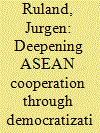

|
|
|
|
|
| Publication |
2009.
|
| Summary/Abstract |
Recent reforms of the Association of Southeast Asian Nations (ASEAN) are viewed by liberal institutionalists and constructivists as triggering a fundamental transformation of the ASEAN Way, the embodiment of the association's established, strictly intergovernmental cooperation norms. This article questions such reasoning, if it is causally linked to expectations of a greater deepening of ASEAN cooperation. Based on recent rationalist theorizing and Snyder's 'nationalist elite persuasion' hypothesis, the article argues that the causal relationships between democracy and regional integration are more complex than assumed in Eurocentric integration theories. By examining foreign policy debates in the Indonesian legislature, the article shows that foreign policymaking has become much more democratic and pluralistic since the end of President Suharto's New Order regime. However, as case studies of foreign policy issues suggest, democratic norms have often been localized by a neo-nationalist agenda that hamstrings the deepening of regional integration.
|
|
|
|
|
|
|
|
|
|
|
|
|
|
|
|
| 8 |
ID:
059213
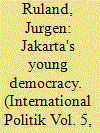

|
|
|
| 9 |
ID:
067311
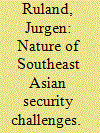

|
|
|
| 10 |
ID:
066689
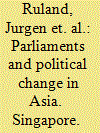

|
|
|
|
|
| Publication |
Singapore, ISEAS, 2005.
|
| Description |
xvii, 324p.
|
| Standard Number |
9812302735
|
|
|
|
|
|
|
|
|
|
|
|
Copies: C:1/I:0,R:0,Q:0
Circulation
| Accession# | Call# | Current Location | Status | Policy | Location |
| 050724 | 320.95/RUL 050724 | Main | On Shelf | General | |
|
|
|
|
| 11 |
ID:
074220
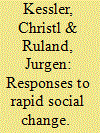

|
|
|
|
|
| Publication |
2006.
|
| Summary/Abstract |
Within the last few decades in the Philippines, there has been outstanding growth among Catholic Charismatic and Pentecostal groups and churches, part of a worldwide proliferation of these strands of Christianity. The article is based on qualitative interviews and nationwide survey data gathered in a research project on religious change in the Philippines, and explores the scope and the character of Charismatic and Pentecostal Christianity in the Philippines. It explains the success of this strand of Christianity by its ability to transfer core concepts and techniques of political populism into the religious sphere. The paper identifies the populist themes within the cognitive framework of Charismatic and Pentecostal religion in the Philippines, as well as the populist techniques applied to mobilize followers. The analysis of Charismatic and Pentecostal religion in the Philippines as populist religion, however, does not imply that such groups and churches can be characterized as populist actors in the political sphere. After outlining the core topics and techniques of populist religion, the paper concludes with a discussion of the political impact of these groups in the still crisis-ridden democracy of the Philippines. These potentials are depicted as potentially ambivalent, due to the ambivalent character of populism itself.
|
|
|
|
|
|
|
|
|
|
|
|
|
|
|
|
| 12 |
ID:
111034
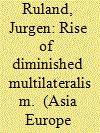

|
|
|
|
|
| Publication |
2012.
|
| Summary/Abstract |
The article argues that the "principled multilateralism" of the immediate post-Cold War period is increasingly giving way to what may be called a "diminished multilateralism." Newly emerging global and regional powers such as the BRICS states (Brazil, Russia, India, China and South Africa) and other rising powers in the Global South are increasingly questioning the legitimacy of the existing international architecture which they regard as a vehicle of the USA and Western countries to conserve their international influence in an era of rapid change. In the process, international institutions have increasingly become arenas of power rivalries which take the form of contests over access and membership, decision-making rules and normative order. The result is an increasing paralysis of these institutions and their inability to solve global problems. One aspect of these institutional power struggles is "forum shopping." The article shows that East Asia and Europe have both become active players in forum shopping. Three conditions facilitated forum shopping: major crises and external shocks; sentiments of frustrated entitlement in connection with exclusive and discriminatory international institutions, and extra- and intra-regional power shifts.
|
|
|
|
|
|
|
|
|
|
|
|
|
|
|
|
| 13 |
ID:
104131
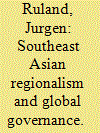

|
|
|
|
|
| Publication |
2011.
|
| Summary/Abstract |
Regional organizations are widely regarded as building blocks of a multilateral order. But this view ignores the fact that regional organizations vary in their contribution to multilateralism. This article therefore adds to Dent's established concept of "multilateral utility" the concept of "hedging utility" which I claim better captures the behaviour of many non-Western regional organizations including the Association of Southeast Asian Nations (ASEAN). In the theory-guided part the article develops six indicators to distinguish the two types of regional organizations: level of institutionalization, governance costs, nesting, agenda-setting, norm entrepreneurship and mode of interaction. Based on these categories, the article examines ASEAN's role as a contributor to a multilateral order. The findings illustrate that indeed "hedging utility" rather than "multilateral utility" better describes ASEAN's agency in shaping international order. The hedging concept resonates well with elite notions of Southeast Asian political culture and also captures the institutional balancing dimension of ASEAN's (security) policies.
|
|
|
|
|
|
|
|
|
|
|
|
|
|
|
|
| 14 |
ID:
066411
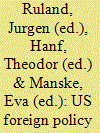

|
|
|
|
|
| Publication |
London, M. E. Sharpe, 2006.
|
| Description |
xv, 269p.
|
| Standard Number |
0765616203
|
|
|
|
|
|
|
|
|
|
|
|
Copies: C:1/I:0,R:0,Q:0
Circulation
| Accession# | Call# | Current Location | Status | Policy | Location |
| 050256 | 327.7301724090511/RUL 050256 | Main | On Shelf | General | |
|
|
|
|
|
|
|
|
|